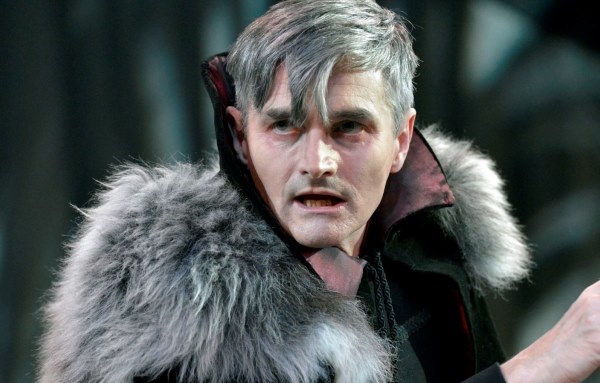Dracula (Theatre by the Lake, Keswick)
Thrilling and sexy from a theatre company at the top their game, says Stephen Longstaffe of Theatre by the Lake’s ”Dracula.”

Dracula.
© Keith Pattison
If you have not read Dracula, then you have seen a film version, and if you are a Dracula virgin, you still have some idea of what happens.
Liz Lochhead’s 1980s version, whilst featuring enough early in-jokes to recognise this, cleverly re-reads the story to recentre it as a tale about desire and fidelity. At its heart are two young couples. We see Mina and Jonathan at different times fall for vampires, one just before and one just after their wedding. Lucy and Arthur are less lucky: Lucy actually becomes a vampire, and Arthur kills her.
Vampires are unsettling on many levels – but the play’s most chilling insight is that their most disturbing power is their ability to make you instantly forget the person you are in love with before you surrender to them. Lochhead also uses a subplot set in an asylum, in which a madman awaits Dracula’s arrival, putting into poetically crazy words unavailable to the young lovers what it is like to be enthralled by this dark lord.
Theatre by the Lake’s technical creatives triumph in combining the liveness of theatre (Dracula disappears before your eyes!) with the visual and aural atmospherics those familiar with film versions might expect. Dan Steele’s composition and sound design is so much to the fore it functions as a soundtrack, cleverly foreshadowing the darker action to come.
Nick Beadle’s lighting design and Andrew Lindsay’s video design use the curtained backdrop to offer atmospheric combinations of shapes and shadows as well as sunny days by the seaside, and there are some nicely judged nods to iconic early twentieth century film versions of the story. Martin Johns’ monumental set contrasts nicely with the familiar Victoriana of his costume design, embodying Lochhead’s interest in the tension between the domestic and what lies beneath.
Director Mary Papadima’s eye for the symbolic stage picture perfectly suits the play, and the first half in particular is completely gripping. Liam Smith’s madman Renfield, a relatively minor presence in other versions of the story, brings a mesmerising physicality to his embodiment of Dracula’s influence.
Matthew Vaughan’s Dracula is a nicely judged combination of sangfroid and bloodlust. Cate Cammack’s Mina and Henry Devas’s Jonathan are both believably buttoned-up Victorian newlyweds and, when Dracula strikes, guilt-free libertines.
The other performances are uniformly very good, but special mention must be made of Katie Hayes’ virtuoso scene near the play’s end where two up till then standard character parts fuse into a single creature – who holds the keys to the asylum cells.
Thrilling, sexy, smart theatre from a team at the top of their game.
Dracula continues at the Theatre by the Lake until 7 November.












